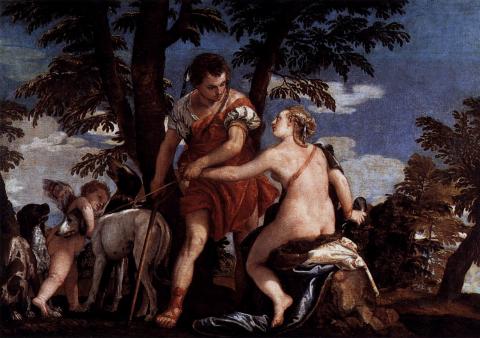Venus and Adonis

The poem was first published in 1593. There is reason to believe that Shakespeare attached great importance to the publication of this work and himself followed its printing, which was carried out in the printing house of fellow countryman Shakespeare R. Field. There is no external data for dating the writing of the poem, except for indications of style and imagery. It is commonly believed that its creation dates back to 1592.
The source was the story of Ovid. Although Shakespeare's work was available in the original, it is possible that he was familiar with it in the English translation of A. Golding (1567).
The poem immediately acquired great popularity among aristocratic and student youth, evoked reactions in the literary environment.
From the very first stanza, the goddess of love and beauty Venus, enticed by the charm of the young Adonis, pursues him with her love. An ancient myth finds under the pen of Shakespeare sensual completeness and color, forcing to recall the paintings of Italian painters of the Renaissance.
Before the reader, there is a pastoral landscape - green fields and dense forests. On the branches of the trees, birds sing, through the thicket the animals make their way. All nature is spiritualized, and against the background of this landscape, we see two beautiful beings. They are endowed with all signs of bodily beauty: Venus is the embodiment of feminine perfection and Adonis, in which beauty and courage are combined with chastity. Venus is all encompassed by passion, it speaks the voice of nature. It is a land full of wild flowering, blood burning with fire; he is cold ice.
Love is the law of Nature and that joy that is given to man as a reward for the fact that he, prolonging his life in posterity, makes life endless. Therefore, Venus reproaches Adonis for not returning Nature to his duty:
"To give birth is the duty of grain and beauty,
You were born, now you are born!"
Why does Adonis reject the joys of sensual love? Because he sees in the passion of Venus only lust:
"I do not want to escape from love,
I have a loathing for lust."

Sensual love of Venus Adonis contrasts his understanding of love as an ideal, divine feeling.
A colorful erotic poem turns into a philosophical dispute. Such debates about the nature of love were full of poetry in the Middle Ages and the Renaissance. Shakespeare here acts as a continuer of the venerable tradition.
Who, then, wins in this dispute the love of the earthly and the love of heaven? Adonis flees from the goddess for the sake of hunting a boar. Vainly warns him of the danger, but he comes to meet her and dies.
Death is not here in the traditional image of a skeleton with a scythe, but in the guise of a wild boar. This has its own symbolism. Death lurks among life in Nature itself. It is not Rock, not something that stands above life, but something that arises in itself.
The poem is crowned with the ideal of beauty. He is in that beautiful flower that grew on the spot where the slain Adonis lies, in the detachment Venus betrays, departing from the earthly vanity and from the people.
Shakespeare does not give preference to either Adonis or Venus. Each of them is right in its own way, but the union of the spiritual and the physical has not been realized. This is the tragedy of life, for love, as it really is, is infinitely far from the beautiful ideal.
